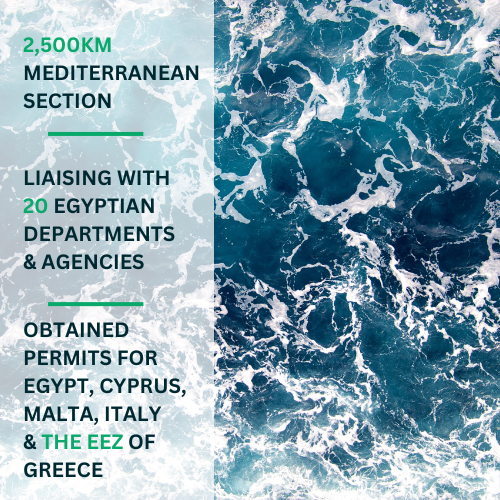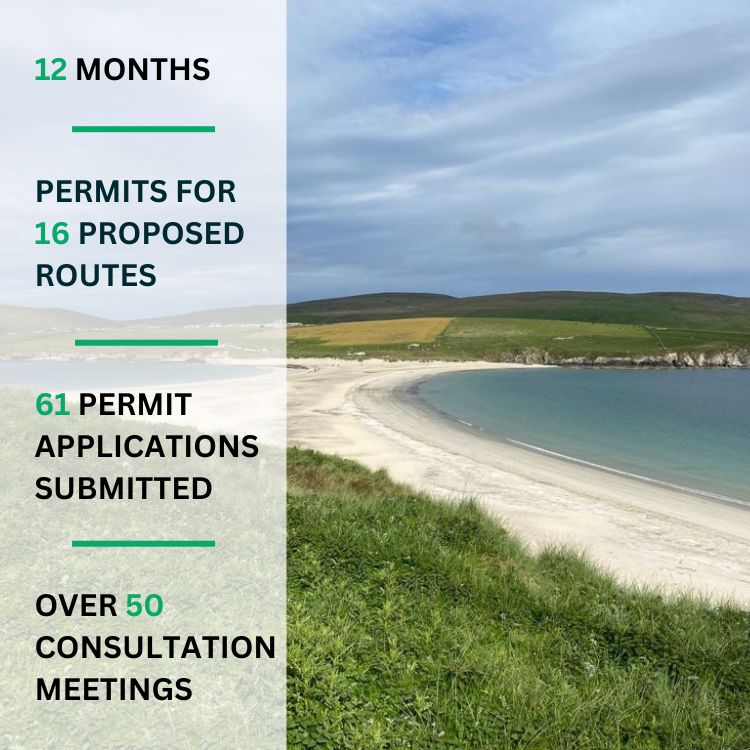Contact Us
Submarine cables are a critical asset supporting the world’s digital economy, connectivity and energy needs. Satisfying the ever growing demand for these needs means that the seabed is becoming increasingly congested, complicating the already complex and varied process of permitting and consents for new infrastructure.
The permitting phase of a cable project sits squarely on the critical path in any project plan, and inefficiencies pose significant risk. Delays with permits could lead to huge project timeline setbacks as well as vessel standby costs running into tens of thousands of dollars per day.
Recent experience shows us that due to the ever-increasing demand for permit applications – both Operational Permits related to vessels, and Permits in Principle (PiPs) related to cable infrastructure in the marine environment – regulators are often not able to meet their statutory timescales resulting in some applications taking over 12 months to get fully processed.
Prioritising project timescales & minimising environmental impacts
Our live database detailing the unique permitting requirements and international, national and local legislation of all coastal nations ensures that we pre-empt permit obligations and keep customers well informed from the start of a project right through to the end, making the process as efficient as possible.
In instances where the environmental assessment fails to address the local qualifying interests of particularly sensitive areas, licence applications can be postponed by the authorities or receive complex conditions that would hamper the project. Our team recognise the real risk associated with this, and work closely with the authorities to overcome regulatory conflicts. With our in-house knowledge and experience, OceanIQ strive to minimise unnecessary environmental restrictions prioritising project timescales.
Meeting your exact needs
OceanIQ’s permitting service is tailored to your exact needs. From provision of permitting input for desktop and cable route studies which outline requirements, identifying contacts and summarising initial steps, to supporting the client in obtaining necessary permits and managing the entire permitting scope for a marine project. This includes work for consortiums such as ACMA, SEAIOCMA and NAZ as well as private zone agreements and emergency cable maintenance permits.
A Permit Feasibility Study investigates the various regulatory requirements governing the proposed cable route survey, installation and potential subsequent maintenance. The study will identify the key regulatory authorities involved in the permit decision making process and seek to organise meetings to discuss and present the project. Involving the authorities at the earliest possible opportunity is key to the success of a project and will result in the Permit Feasibility Study being able to produce a detailed permit matrix and risk log covering the entire project lifecycle from the outset. Conducting these studies early on in the project helps to determine project timescales and potentially avoid delays which can be costly. Being aware of permit timescales underpins project planning which is ultimately fundamental for achieving target deadlines.
OceanIQ has extensive experience conducting permit feasibility studies all over the globe having completed studies on every continent.
OceanIQ are able to support, manage and acquire the Operational Permits associated with cable installation and maintenance vessels. OceanIQ obtain all the Operational Permits for sister company Global Marine, who have a cable installation and maintenance fleet strategically based across the world for 365 day emergency response, or for planned installation campaigns.
Recently OceanIQ successfully managed and acquired the Operational Permits for the 2,500km Mediterranean section of the 15,000km PEACE (Pakistan & East Africa Connecting Europe) cable system. Following on from the PEACE project in the Mediterranean, OceanIQ then supported SBSS with the Operational Permits for the UNSC project in Angolan waters.
OceanIQ can act as the coordinator between the projects installation and maintenance teams and the local consultants and shipping agencies.
Engagement with the authorities and local stakeholders significantly de-risks the permitting aspect of a project and should be conducted continuously throughout the lifecycle of the project.
The key consultation phase of a project starts from the early introductory phase, pre and post permit application, followed by post consent. OceanIQ will maintain this correspondence with the authorities and local stakeholders to ensure the project is positively advertised mitigating any expected or unforeseen risks associated with the project.
In most cases, crossing and proximity notifications and agreements with third party assets are inevitable given how congested the seabed is, and are usually required to be in place prior to operations.
OceanIQ provides technical support during the negotiation process. We work with our cable route engineers and installation team colleagues from Global Marine to ensure the best technical solution is achieved for all crossings whether it be with pipelines, power cables or telecoms cables. As part of the crossing or proximity agreement, a notification schedule and/or the provision of data may be requested by the third-party asset owner which OceanIQ manage during and post operations.
A Fishing Liaison Officer (FLO) will liaise between the cable operator, surveyor, installer and the fishing industry as well as other legitimate users of the sea. Activities include:
> Early Fishing Engagement Workshops
> Port Tours
> Fishing Activity Study
> Fishing Liaison Mitigation Action Plan
> Guard Vessel Deployment
> Conflict Resolution
> Compensation for Disruption
Laying telecommunications and power cables within UK territorial waters (up to 12 nautical miles from shore) requires a Marine Licence from the authorities. These can include:
> Environmental Assessment
> Archaeology services support
> Ecological services support
> Navigation Risk Assessment
> Charting
> Post application support services

